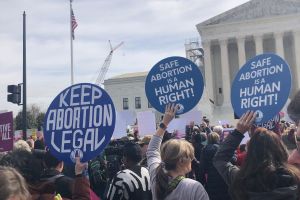Racism, progress and original sin

I was having a discussion (more like a debate) with a friend about eliminating racism. Racism has been with us since the beginning of time, but the serious discussion of racism in modern times dates from the 1960s.
Before 1972, Methodism declared its social stands in the Disciplines, but by 1972, there was not enough room in the Discipline for all the things the church wanted to declare itself on, so it authorized a Book of Resolutions, which in 2016 totaled 873 pages. In the 873 pages, 19 are directed toward racism. We United Methodists are against it. We wish to combat it, fight it, eliminate it, denounce it, eradicate it and overcome it.
My comment in the discussion with my friend, which raised the intensity of the debate, was that we are not going to win the war against racism. We can do away with slavery, segregation, and red-lining, but prejudice (not just based on skin color but because of class, wealth, religion, how tall or short people are, or how obese or skinny — all kinds of things) is going to be with us until the Lord returns.
We might talk about love, diversity, inclusiveness, justice and reparations, but at the heart of racism is sin. Despite our best efforts, we don’t seem to be doing so well in overcoming sin, at least by our human efforts. I remember a General Council of Ministries report from 1984 where a high-minded goal was to eliminate racism. In a random poll some thought this would take until 2020 to accomplish (a few thought this was attainable by 2000).
In our present fight against racism (and other social sins) we have discovered that many of our heroes, when truth is known, do not come off so well. Thomas Jefferson and George Washington were slaveholders; so, in the name of justice their place in history should be diminished. To do this we need to tear down statues, change the names of streets, and ban books from libraries. Most of us should not pry too much into our family histories lest we find our own dark blots in the story.
I would suggest that any discussion about differences, injustices, privilege and whatever else disturbs us should start with a confession of sin. We fall short of the glory of God. When we are doing what comes naturally, we are not loving our neighbors as ourselves. Our understanding of Christianity starts with the doctrine of Original Sin. In Calvinist circles it is referred to as Total Depravity. John Wesley, in his sermon on Original Sin, states simply that “All who deny this, call it 'original sin,' or by any other title, are but heathens still, in the fundamental point which differences Heathenism from Christianity.” This is reaffirmed in the Articles of Religion of the United Methodist Church, and, historically at least, in Methodist literature, hymns and teaching. Until the 1930s the Methodist baptismal ritual started with the words: Forasmuch as all men are conceived and born in sin …
Enter modernism, or liberalism, or progressivism or reconstructionism, or whatever, with a different understanding of human nature and sin. Modernism declared talk of sin, at least personal sin (we treat social sin differently), was considered demeaning or negative. Most people were not aware of being alienated from God. They did not consider themselves flawed. Starting with Horace Bushnell (1802-1876) who wrote the book, Christian Nurture, human beings were to be considered as neither good nor bad, nor sinful or not sinful. They could be educated to be upright citizens and did not need conversions or revival meetings, atonements, or blood or “salvation.” Indeed, if well-educated persons put their minds to it, we could build a better world. We could bring in the Kingdom of God on earth. And this should be the real task of the Church: to create a world of harmony and peace and, in the words of one of the modern creeds, a world characterized by the Fatherhood of God and the Brotherhood of man.
This would come about by good works and good intentions and social planning and government intervention and by putting the right kind of people in authority. The end goal, as the hymn proclaimed in the 1935 hymnal (#513, vs 3): Nation with nation, land with land, unarmed shall live as comrades free; In every heart and brain shall throb The pulse of one fraternity. To help redirect our path our leaders in the 1935 hymnal changed words in the baptismal ritual from a recognition of being conceived in sin, to: Forasmuch as all men are heirs of life eternal and subject of the saving grace of the Holy Spirit …
And, to be consistent, the 1935 hymnal dropped sections on Depravity, Judgment, Retribution, and Repentance and replaced them with sections on Brotherhood, Activity, Zeal, and Service. The thought was we need education, not revivalism; we need a scientific understanding of human nature, not an outdated understanding inherited from the dark ages. When I once raised the question with persons on the Curriculum Resources Committee of the denomination as to why Jesus was not being portrayed on the cross for children, even on Good Friday, the response was that we wait until children are in junior high to portray Jesus on the cross lest they get the wrong idea.
I attended seminary in the late 1950s. Neo-orthodoxy was big in those days. I am thankful for Karl Barth and Emil Brunner and Reinhold Niebuhr and others who recognized the failings of the modernism of that time. World War I, the war to end all wars and make the world safe for democracy, had not made the world safe for democracy. The League of Nations did not usher in a new world order. The Communism of the 1930s did not bestow economic blessings. The Renaissance understanding of man as perfectible proved to be flawed. Christian realism, based on an understanding of Original Sin, recognized there are severe limits as to what we can achieve in public life. Moral idealism, though wonderful in theory, disarms us in the face of human sinfulness and the persistence of evil.
It must be discouraging to be a “progressive” today. The progressive worldview is based on the assumption that in our modern day people are wise, have accumulated more knowledge and more technology and have fine-tuned political and economic systems so that well-being and happiness are available for all. Has it not occurred to these people that despite increasing prosperity, advanced political and social systems, and an increased accumulation of knowledge, that we still live in a world of wars and violence and exploitation and racism and sexism and ageism and poverty?
So, those of us who uphold classic Christian doctrine (whether Methodist, Presbyterian, Episcopal or Congregational) reaffirm our church’s historic stand on sin. We are sinners. There is such a thing as the wrath of God. God sent his Son, Jesus the Christ, to make atonement for sin. By faith we receive God’s grace and forgiveness. By his Holy Spirit we are new creatures, are part of his body the Church and empowered for a life of service.
The consequence of this life of service is to love others, seek justice for all, and believe in the ultimate victory of God’s plan for this world.
We call this the Gospel, the good news. This is what Christianity is all about.
What does this mean practically?
We confess sin. We Christians are part of the solution, but we are also part of the problem. We have offended even when unaware that we offended. We are racists even when we were not aware of our racism. We are self-seeking even when we are not aware of being self-seeking.
Years ago — I was in high school — I got a job at the state fair. I was an usher in the grandstand. I showed people to their seats, wiped their dusty seats off, and was friendly. For the first couple of hours on the job I was very happy. I had no ulterior motives. I met people. I was doing a service. Then a man reached out his hand and gave me a dime. A tip! I was instantly corrupted. I could make money doing this ushering stuff. From that point on I showered attention on the good prospects (businessmen in suits, not teen-agers). In King James language my eye was no longer single. I had hidden motives. So goes sin.
So, the necessity for each of us to confess our own sins. Evangelicals are not good examples here. Modern worship music does not call for us to repent of sin. Our unstructured and non-liturgical services do not set aside time for repentance. I have sat through many evangelical worship services without any prayers for repentance. This is why, when I was pastoring and preparing worship materials each week, I always included prayers of repentance. We need to be aware, and we need to confess before God, that we are complicit not just in individual sin, but in social sins. Racism and sexism and prejudice are real and we all are infected.
Originally published at Juicy Ecumenism.
Riley B. Case is a retired United Methodist clergy member of the Indiana Conference who has for many years authored articles for the Confessing Movement. His articles are published in the Methodist Voices series appearing on Juicy Ecumenism, the blog of the Institute on Religion & Democracy.




























